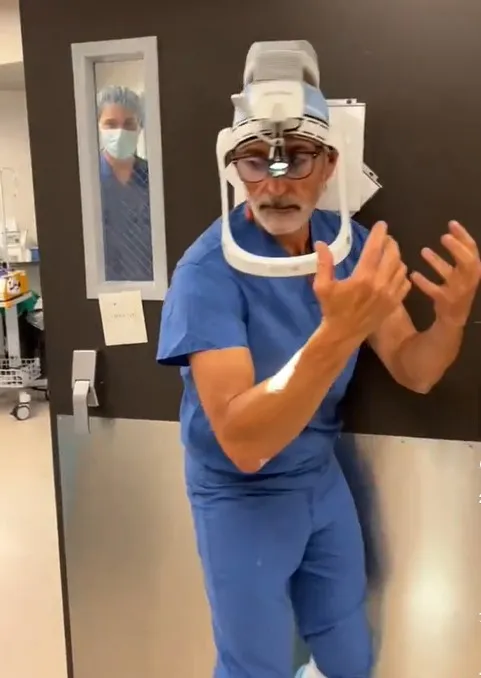Have you ever noticed how surgeons walk into the operating theatre with their hands raised? This simple yet significant gesture has intrigued many, and understanding its purpose reveals the critical measures taken to ensure patient safety. Let’s dive into why this practice is an integral part of surgery and the meticulous protocols surgeons follow to maintain sterility.

The Crucial Role of Sterility in Surgery
Sterility is the cornerstone of any surgical procedure. When a patient is on the operating table, their immune defenses are compromised, making them highly vulnerable to infections. A single germ introduced into the surgical site can lead to severe complications, including infections that can hinder recovery or even endanger life.
Surgeons raising their hands is not merely a ritual—it’s a calculated move designed to prevent contamination. This act highlights the precision and attention to detail that defines the medical profession.
The Reason Behind Raised Hands: Maintaining Sterility
One of the primary reasons surgeons keep their hands raised after scrubbing in is to preserve sterility. Before stepping into the operating room, surgeons undergo a rigorous scrubbing process, using specialized antiseptic solutions to cleanse their hands and forearms of any potential germs or bacteria.
Once their hands are sterile, the positioning becomes crucial. Keeping their hands raised ensures they remain above the waist and below the neck—zones less likely to come into contact with non-sterile surfaces. This minimizes the risk of contamination, ensuring that the operating field remains as clean as possible.

The Water Flow Factor: Preventing Cross-Contamination
Another reason for raising their hands is to control how water or fluids flow. After scrubbing, the arms may still have residual water or antiseptic solution. Gravity ensures that if the hands are raised, the water flows downward, away from the hands.
If a surgeon were to lower their hands, there’s a risk of unsanitized water from the arms contaminating the sterilized hands. This simple act of keeping hands elevated demonstrates the meticulous care surgeons take to safeguard their patients.
The Role of Gowns and Gloves in Sterility
While hand-raising is crucial, it’s only one part of a larger system designed to maintain cleanliness during surgery. Surgeons also wear surgical gowns and gloves, which act as protective barriers.

- Surgical Gowns: These prevent the surgeon’s clothing from coming into contact with the sterile surgical site.
- Gloves: Sterile gloves are worn to create a layer of protection, ensuring that no bacteria from the surgeon’s hands can reach the patient.
Surgeons must avoid touching anything unsterile after donning gloves. Even a momentary lapse could compromise sterility, requiring the surgeon to re-scrub and re-glove.
Why Social Media Is Educating the Masses
In the age of social media, medical professionals are sharing insights into their practices, helping the public better understand the intricacies of healthcare. A recent example is Dr. Gregory Tchejeyan, a joint surgeon who took to TikTok to explain why surgeons raise their hands before entering the operating theatre.
The video garnered millions of views, sparking curiosity and appreciation for the rigorous protocols surgeons follow. Viewers reacted with a mix of surprise and humor, with comments ranging from “I thought this was common sense” to “What happens if you have an itch mid-surgery?”
Public Reactions: A Blend of Curiosity and Humor
The responses to Dr. Tchejeyan’s video showcased how little the general public knows about surgical practices:
- “I thought that was common sense,” said one viewer, surprised that others were unaware.
- “What if you’re in the middle of surgery and have a really bad itch?” asked another, humorously highlighting a common human curiosity.
- “Technically, the water isn’t sterile,” one user pointed out, emphasizing the importance of sterile techniques over assumptions about cleanliness.
These interactions underscore the power of education and the need to demystify medical practices for the public.

Attention to Detail: The Key to Patient Safety
Every small action in the operating room has a purpose. From scrubbing protocols to gowning and gloving, and yes, even raising hands, these measures are all designed to protect patients.
The operating room is a high-stakes environment where there’s no room for error. Every drop of water, every touch, and every movement is carefully controlled to maintain a sterile field.
Conclusion: A Simple Gesture with Profound Importance
The next time you see a surgeon walk into the operating theatre with their hands raised, you’ll know it’s more than just a quirky tradition. It’s a testament to their commitment to patient safety and the rigorous standards of modern medicine.
From meticulous scrubbing techniques to social media education, this seemingly small act plays a vital role in the success of surgeries and the well-being of patients.
So, what’s your takeaway? Whether it’s the precision of surgeons or the humor sparked by social media, one thing is clear: every detail matters when it comes to saving lives.